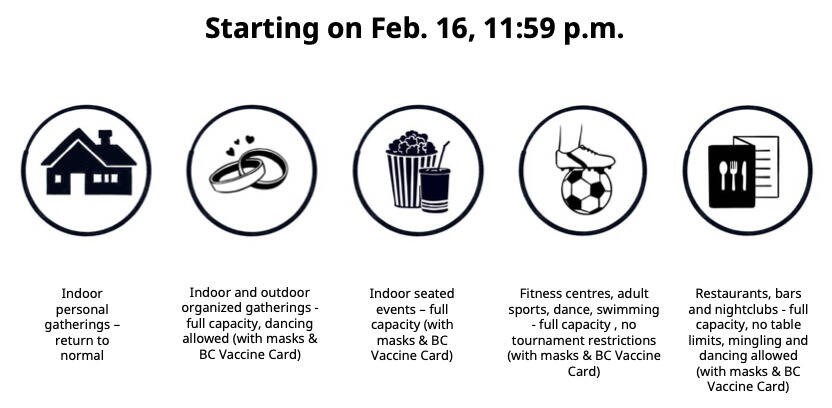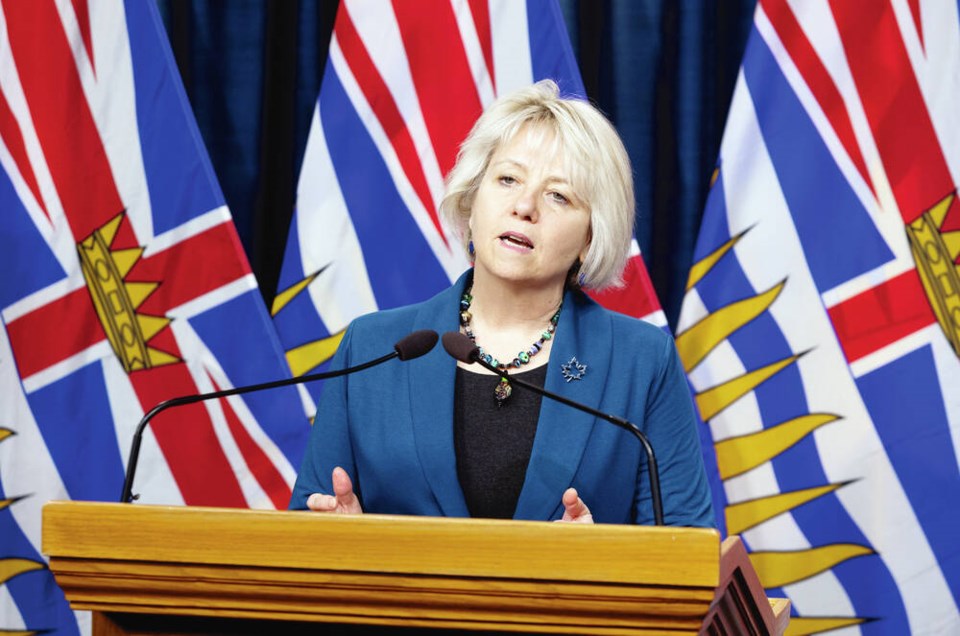B.C. is phasing in an easing of pandemic restrictions that will end capacity limits for gatherings as long as masks, proof of vaccination and safety plans are used.
Other restrictions will be reviewed in March prior to spring break for schools, and in April prior to Easter celebrations. The B.C. Vaccine Card remains in effect until June 30 and a mask mandate for indoor public spaces will stay until further notice.
Provincial health officer Dr. Bonnie Henry said the number of people in hospital with COVID has peaked and community immunity is high, but the pandemic continues globally, and the virus will likely continue to develop new strains that are able to evade the immune system and spread even faster.
Under the phased reopening, beginning Thursday, indoor personal gatherings, including vacation rentals, can return to normal, and indoor and outdoor organized gatherings — such as wedding receptions, birthday parties and celebrations of life — as well as indoor seated events, including theatres and sports events, can return to full capacity.
Fitness centres, adult sports, dance, swimming and tournaments can also return to full capacity.
Restaurants, bars and nightclubs will be able to operate at full capacity — the province is dropping the requirement of only six people per table — and mingling and dancing will once again be allowed.
Ian Tostenson, president and CEO of the B.C. Restaurant and Foodservices Association, said he was so relieved to hear the reopening plans, he cried when he was briefed. “Government, industry and B.C. citizens walked together over the last two years under Dr. Henry’s incredible guidance to get to this point,” said Tostenson. “This is such a well-deserved and amazing day for B.C.”
Grant Olson, who runs the Strathcona Hotel and entertainment complex, including pubs and restaurants, said the reopening went further than he expected. He recalled how publicans reacted when they were closed for St. Patrick’s Day in March 2020 — pool tables were pushed away, dart boards were deactivated and concerts cancelled.
“We are very pleased with the announcement,” said Olson. “Everything’s basically back to normal.”
The Strathcona undertook major renovations during the pandemic, including for Distrikt nightclub, which will open in the spring, likely under the name Wicket Hall, as a more comprehensive food, beverage and events venue.
The main worry now is the labour shortage — “everyone will be trying to hire staff at the same time” — and getting office people back into the downtown core, he said. “There’s hundreds of offices that have little to no people in them and downtown’s businesses need people to come back downtown.”
In January, the B.C. Public Service Agency encouraged employees to work from home if possible. On Tuesday, it said it is assessing next steps and expects “to have an update later this week.”
Health measures that remain and will be reviewed by March 15 and April 12 include a mask mandate for all indoor public spaces, proof of vaccination via the B.C. Vaccine Card, COVID-19 safety plans, long-term-care visit restrictions, K-12 school and child-care guidelines, faith community guidelines, restrictions on child and youth overnight camps, and orders related to industrial camps.
“We need to respect that people need to go at their own pace, and businesses will need to go at their own pace, depending on their own risk,” said Henry.
Only one designated essential visitor and one designated social visitor are currently allowed in long-term care, but that could be increased, said Henry. There remain 22 outbreaks in Island Health long-term care facilities and one outbreak in an acute-care facility — Nanaimo Regional General Hospital.
K-12 schools continue to be required to have safety plans, and there are restrictions on extracurricular events and spectators at sports events. Masks are required in schools.
School officials said Tuesday that there are many activities students, staff and families are looking forward to, maybe none so much as in-person graduation ceremonies. “I really hope they’ll get an opportunity to do that this year,” said Ravi Parmar, chairman of the Sooke School Board.
In faith communities, capacity is capped at 50 per cent if proof of vaccination is not shown by all congregants.
While provinces including Quebec, Ontario, Alberta and Saskatchewan have dropped the requirement for vaccine cards or announced plans to do so, Henry said that policy will remain in B.C. as part of a mitigation strategy for the highest-risk settings where capacity limits have been lifted.
“We’re different from Ontario and Quebec in that regard,” she said. “It’s played a role in reducing, and not eliminating, the risk of transmission,” she said of the proof-of-vaccination card.
Premier John Horgan said pressure from protesting truckers played no part in the province lifting restrictions, which were to be eased anyway by Family Day. “This is not brought upon the public today by any protests, any horn-honking, any encampments. It was brought about because this was the plan we had when we brought in the restrictions to protect people at a time of uncertainty.”
COVID immunization campaigns will continue, including for boosters.
On Tuesday, B.C. reported 787 people in hospital with COVID-19, including 82 in Island Health. One hundred and twenty-four were in ICU, including 14 in Island Health. Two more people have died, for a total of 2,766 deaths from COVID-19.
On Tuesday, 55 per cent of eligible children ages five to 11 had received their first dose of the COVID-19 vaccine, 90 per cent of British Columbians age 12 and older had received a second dose, and 52 per cent had received a booster or third dose.




.jpg;w=120;h=80;mode=crop)

